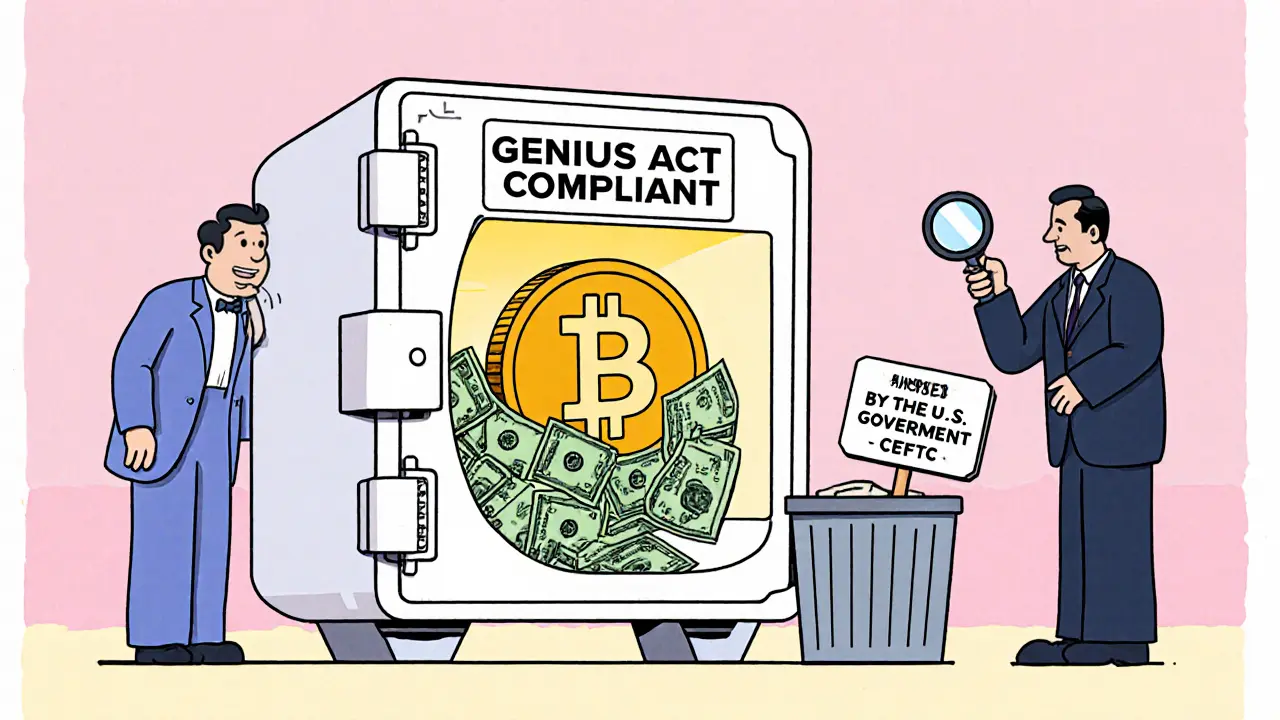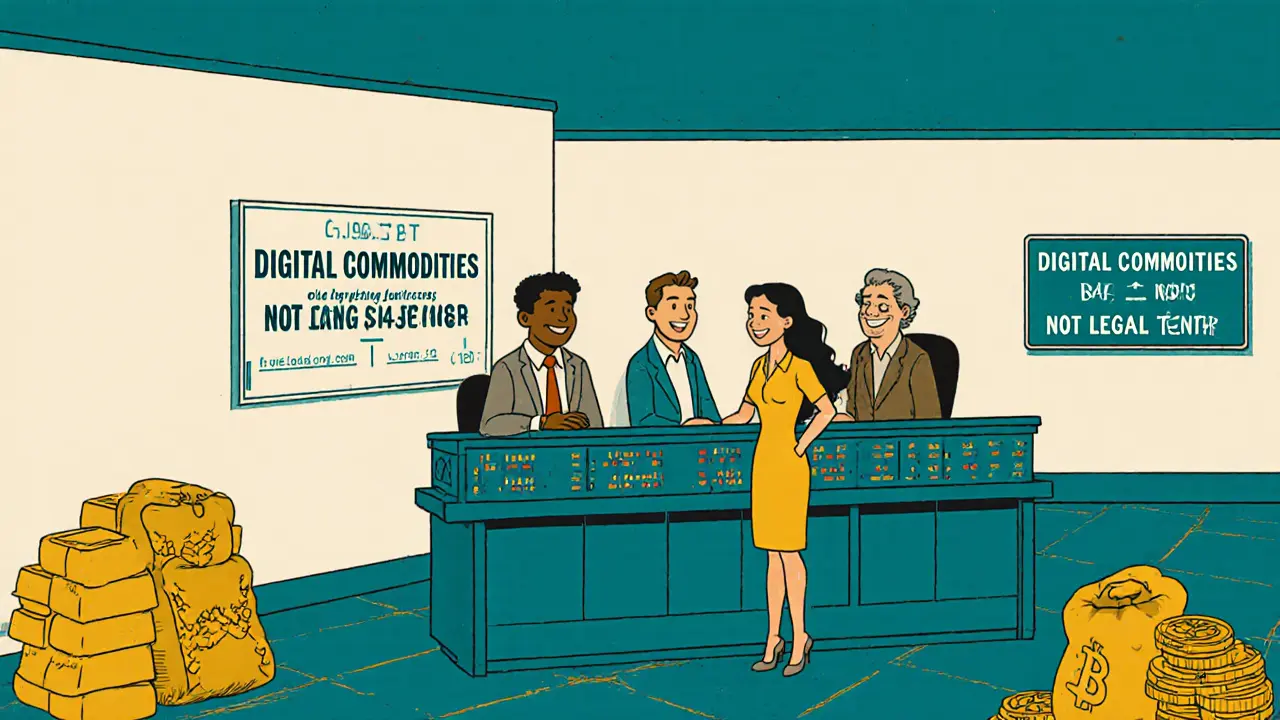Cryptocurrency Legal Tender Status Checker
Enter a cryptocurrency name to check its legal tender status in the United States.
As of 2025, cryptocurrency still isn’t legal tender in the United States. Not Bitcoin. Not Ethereum. Not even the most popular stablecoins. That hasn’t changed. But if you think that means crypto is stuck in regulatory limbo, you’re missing the bigger picture.
Legal Tender Means Something Very Specific
Legal tender isn’t just any money people accept. It’s the currency the government says you must accept to settle a debt. If you owe someone $500, and they demand payment in U.S. dollars, you can’t refuse and say, "I’ll pay you in Bitcoin." The law says they have to take the cash. That’s legal tender. And only the U.S. dollar has that status in America.That hasn’t changed. Even after all the new laws passed in 2025, the Federal Reserve still holds the exclusive right to issue legal tender. Cryptocurrencies? They’re still property under tax law, not currency under payment law.
The GENIUS Act Changed Everything-But Not That
In July 2025, President Trump signed the Guiding and Establishing National Innovation for U.S. Stablecoins Act-the GENIUS Act-into law. This was the biggest crypto regulation in U.S. history. But here’s what it didn’t do: it didn’t make stablecoins legal tender. In fact, it made sure no one could claim they were.The GENIUS Act forces stablecoin issuers to hold 100% reserves in cash or short-term U.S. Treasuries. They have to publish monthly reports showing exactly what backs their coins. If they go bankrupt, stablecoin holders get paid before almost every other creditor. That’s strong consumer protection.
But the law also has a clear warning built in: issuers can’t say their stablecoins are backed by the U.S. government, insured by the FDIC, or legal tender. That’s not an accident. It’s a firewall. The government wants stablecoins to be safe, reliable, and useful-but still separate from the dollar.
Bitcoin and Ethereum Got a New Home
The Digital Asset Market CLARITY Act, passed by the House in July 2025, created a new category: digital commodities. Bitcoin and most versions of Ethereum now fall under this label. That means they’re regulated by the CFTC, not the SEC.Before this, crypto companies lived in fear. Was their token a security? The SEC said maybe. The CFTC said maybe not. That uncertainty scared off banks, exchanges, and investors. Now, if a blockchain is decentralized enough, its native token is treated like gold or wheat-not a stock.
This doesn’t make Bitcoin legal tender. But it does mean you can now trade Bitcoin on regulated exchanges with real investor protections: trade surveillance, segregated customer funds, and anti-money laundering checks. That’s a huge step toward legitimacy.

Why the SEC’s SAB 122 Move Mattered
Back in January 2025, the SEC killed its old rule, SAB 121. That rule forced banks to count crypto assets they held for customers as both an asset and a liability on their balance sheets. That doubled their capital requirements. No bank could afford it. So most refused to custody crypto at all.SAB 122 fixed that. Now, when a bank holds Bitcoin for you, it’s treated like holding gold in a vault. No extra capital needed. No balance sheet distortion. That opened the door for Fidelity, JPMorgan, and others to finally offer full crypto custody services. Suddenly, institutional money started flowing in-not because crypto became money, but because it became safe to hold.
CFTC’s Crypto Sprint: Trading Gets Real
In August 2025, the CFTC launched its "Crypto Sprint"-a fast-track effort to let spot crypto trading happen on regulated exchanges. For the first time, you could legally buy Bitcoin directly on a CFTC-registered platform, not just trade futures or ETFs.This wasn’t about making Bitcoin legal tender. It was about bringing crypto trading into the same legal framework as commodities like oil or soybeans. Now, hedge funds, pension plans, and even individual investors can trade crypto with the same transparency and oversight as traditional markets.

What’s Still Off Limits
Despite all this progress, three things haven’t changed:- You still can’t pay your rent with Bitcoin and force your landlord to accept it.
- The IRS still taxes crypto as property, not currency.
- The Federal Reserve still controls the money supply-and won’t share that power.
Even countries like El Salvador that made Bitcoin legal tender didn’t make it the only money. They still use the U.S. dollar as their primary currency. The U.S. isn’t going to do the same. The dollar is too deeply embedded in global trade, defense, and finance.
So What’s the Point of All This Regulation?
The goal isn’t to replace the dollar. It’s to make crypto work within the system-not outside it.Stablecoins can now be used for cross-border payments, payroll, and retail transactions without risking collapse. Bitcoin can be held in 401(k)s and traded on Wall Street. Crypto firms can raise capital without fear of sudden SEC enforcement.
That’s the real win. You don’t need legal tender status to build a thriving economy around digital assets. You just need clarity, safety, and access to traditional finance.
What’s Next?
The Senate still needs to pass the CLARITY Act. Once it does, the U.S. will have a full regulatory framework for crypto: stablecoins under the GENIUS Act, decentralized tokens as digital commodities under the CFTC, and centralized tokens under the SEC.Expect more banks to offer crypto custody. More retailers to accept stablecoins. More apps to pay bills in USDC. But don’t expect a day when you walk into a grocery store and the cashier says, "That’ll be 0.0023 BTC."
Legal tender? Still the dollar. But crypto? It’s finally part of the system.

10 Comments
so like... i just paid my electric bill in usdc and my utility company didn't even blink. i thought they'd say no but they just processed it like it was cash. weird how fast this is all happening, huh?
in india we've been using uPI for years to send money like it's text messages. now seeing crypto get real regulation in the us? it's like watching your little cousin finally grow up. proud moment for tech everywhere. 🙌
i've been watching this space since 2017. the shift from "is this a security?" to "here's how we regulate it" is massive. it's not about replacing the dollar-it's about giving people tools that work. finally, someone got the difference between legal tender and usable asset. thank you for clarity.
they're letting crypto in so they can track it better. watch. every wallet will be linked to your social security number next year. the fed doesn't want to lose control. they're not protecting you-they're preparing for the digital surveillance state. they've been planning this since 2020. don't believe the "safe and regulated" fairy tale.
ok but let's be real-why are we even letting private companies issue digital money? this is just the fed letting wall street create their own currency. we already have a perfectly good dollar. now we're gonna have 50 different "stablecoins" and people will forget how to count in cents. this is how empires crumble. 🇺🇸
this is actually kind of cool 😎 banks finally getting onboard? yeah! now my 401k can hold btc without me needing a degree in finance. no more "crypto = scam" vibes. time to finally stop hiding it from my grandma.
I think it's important to recognize that this isn't about replacing the dollar, and I really appreciate how the legislation draws clear boundaries-stablecoins aren't legal tender, Bitcoin isn't currency, but they're still protected, regulated, and integrated into the financial system in a way that respects both innovation and tradition. It's a delicate balance, and honestly, I'm impressed that lawmakers managed to avoid the usual chaos. Maybe... just maybe... we're learning how to do this right.
the dollar's dominance isn't about logic... it's about inertia. empire doesn't die because it's bad-it dies because it's forgotten. crypto isn't replacing the dollar... it's just giving people another option. and sometimes... that's enough. the real revolution isn't in the code... it's in the quiet decision to try something new.
GENIUS Act? more like GIMMICK act. 100% reserves? big whoop. if it’s not legal tender it’s just a ledger. and why does the CFTC get crypto now? SEC was doing fine. this is just regulatory arbitrage disguised as progress. lazy.
in my village in punjab, we still barter sometimes-grain for milk, tools for labor. now i see people in america using usdc to pay for groceries and calling it "innovation." funny how technology mirrors old ways. we never stopped trusting value-we just changed what it looked like. this isn't the end of the dollar. it's just the beginning of a longer conversation.